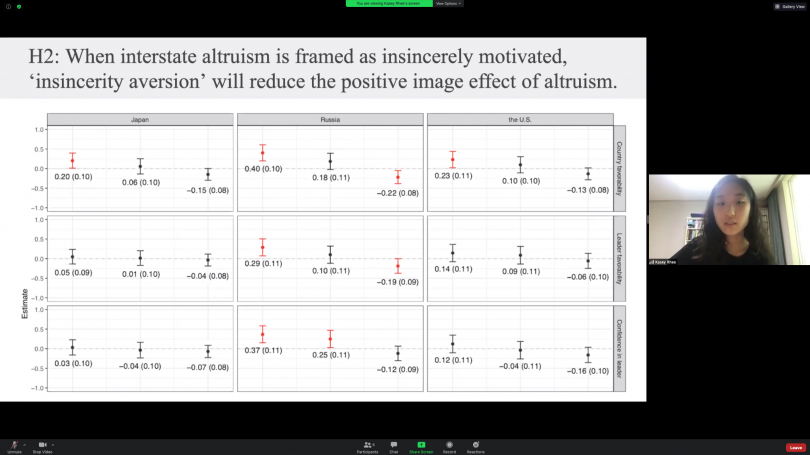
- Undergraduate
- Research
- About the Program
- News & Events
- People
Back to Top Nav
Back to Top Nav
Back to Top Nav
Back to Top Nav
Independent research is a key component of the undergraduate curriculum in the Program in Quantitative Social Science (QSS) at Dartmouth College. All students majoring in QSS complete independent research projects, which are presented in front of a faculty audience. Some QSS majors work on undergraduate theses and others on one quarter projects. One quarter QSS research projects are normally completed in winter term of students’ last years on campus, but these plans have been upended by the COVID-19 pandemic. One current third-year student chose to undertake a one quarter project during this past term and in addition has plans to pursue a QSS thesis starting this fall.
Kasey Rhee, a member of the Class of 2021, recently completed and defended her QSS one quarter research project. Titled "Nation branding and donations during the COVID-19 pandemic," Kasey's project explores how a nation can use foreign donations to burnish its international image. Set in the COVID-19 pandemic, Kasey designed and implemented a randomized survey experiment that allowed her to test how respondents, all of whom were located in the United States, reacted to donations of medical supplies from Russia, and how those donations were framed. Kasey finds that Americans who are informed of Russia's donation are more favorable to Russia and Putin. If Americans are told that Russia's donation might have been strategic rather than sincere, though, the positive effect of the Kremlin's gift on U.S. perceptions of the country dissipates.
Kasey has spent this quarter in Seoul, taking classes in Machine Learning & Statistical Analysis, the American Political System, and Quantitative Analysis of International Cooperation, in addition to her one quarter project. Being 13 time zones away from Hanover was not without its challenges, but Kasey has expressed her gratitude towards her advisors, professors, and Dartmouth librarian Wendel Cox for making the transition to remote learning as smooth as possible.
Kasey's QSS project was advised by Charles Crabtree and Yusaku Horiuchi. Dr. Crabtree, who received his PhD in political science from the University of Michigan in 2019, will be joining Dartmouth's Department of Government as an Assistant Professor in July 2020. Dr. Crabtree has spent the 2019-20 academic year at the Tokyo Foundation for Policy Research, studying gender and racial discrimination in Japan.
Professor Horiuchi is the Mitsui Professor of Japanese Studies and Professor of Government at Dartmouth. He is currently working on a range of projects based on survey experiments in Japan, Australia, the US, and European countries. Among other things, Professor Horiuchi's recent research focuses on attitudes toward refugee resettlement and immigration and foreign public opinion about the US. Professor Horiuchi has advised many QSS research projects and regularly publishes with his students. One of his recently published articles (“Has Trump Damaged the U.S. Image Abroad? Decomposing the Effects of Policy Messages on Foreign Public Opinion,” with Alexander Agadjanian. Political Behavior 42:2, pp. 581-602) is based on an independent research paper by a former QSS student, Alexander Agadjanian, who is starting the Ph.D. program in Political Science at the University of California, Berkeley, this coming fall.
This year's QSS research projects were guided by Dr. Robert Cooper, who is the QSS Director of Undergraduate Research, and Dr. Ahra Wu, who has advised QSS students this year and taught an introductory course in statistics in the Department of Government as well as a joint QSS-Government seminar course in quantitative analysis of international cooperation. Dr. Wu will be starting a position as a data science/analysis research librarian at Hamilton College, and recently has been revising her dissertation studying the effect of military alliance designs on interstate disputes. According to Dr. Cooper, this year's QSS one quarter research projects spanned a wide range of topics and methods in fields like government, sociology, education, economics, mathematics, sports, and music. Each year, at least one of the quarter projects proves worthy of revision and submission to a peer-reviewed journal. Public presentations at the end of each winter quarter cap the QSS research project course, allowing for the Dartmouth community to engage with QSS students and their research.
Kasey's QSS research project is part of a continuing joint collaboration with Drs. Crabtree and Horiuchi. In the spring term, Kasey, Dr. Crabtree, and Dr. Horiuchi participated in an international collaboration centered on social and moral psychology in the context of the COVID-19 pandemic. This effort involves over 100 scholars, collecting national samples from more than 60 countries and regions of the world. Kasey, Dr. Crabtree, and Dr. Horiuchi also fielded a survey experiment in Japan to study Japanese citizens’ response to the government’s social distancing request.
Kasey and Drs. Crabtree and Horiuchi are planning on building on Kasey's findings, and Kasey has received a Thomas D. Sayles grant from the Dartmouth’s Ethics Institute to field a new survey experiment in Summer 2020.